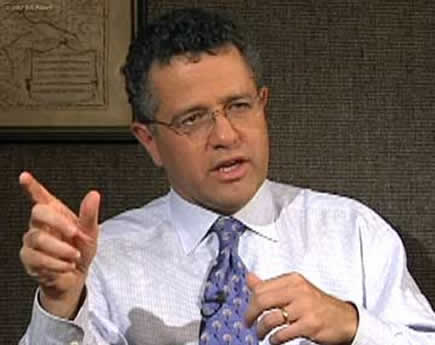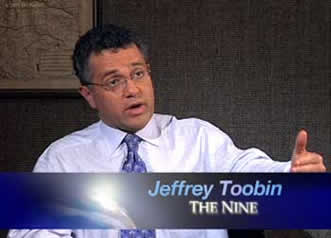 |
Jeffrey Toobin
|
“(Supreme Court Justices) can make good rules or bad rules, but they are making the rules and no one should be mistaken about that. One of my favorite sayings about the Court is Justice Robert Jackson’s, ‘We are not final because we are infallible. We are infallible because we are final.’
“There is no such thing as law independent of politics or independent of ideology,” Mr. Toobin continues. “(Today) you have a situation where the Court is divided and polarized more than it’s been in a long time. Roberts, Alito, Scalia and Thomas on the conservative right. Stevens, Souter, Breyer and Ginsberg on the left. Kennedy in the middle, usually siding with the conservatives. Justice Stevens is 87, Justice Ginsberg is 76. David Souter is 70 and doesn’t enjoy the job very much. So we are likely looking at three of the four liberal justices leaving in the next few years.
“If a Republican is elected president in 2008 and appoints those three replacements, we’re looking at easily a generation of very conservative justice. Even if the Senate remains Democratic, the Justices will be conservative.
“The only way the Democrats are going to be able to reshape the Court is not through having senators fighting with the president over appointments. It’s by having presidents making appointments.”
“Frankly I think that's how it should be, because the Framers set up a system where the President gets to put his or her stamp on the Court. There is no such thing as law independent of ideology or politics.”
Mr. Toobin is careful in how he talks about Constitutional law.
“Outside a certain sort of basic agreement that everybody has, (Supreme Court decisions are) not about right and wrong. These are choices, largely political choices, the Justices make. And I think we need some truth in labeling.
“The Justices identified with ‘originalism’ are chiefly Justice Scalia and Justice Thomas. The subtext of originalism is a conservative political agenda. I don’t doubt the sincerity of the originalists, but let’s not kid ourselves about whose interests are served by originalists.”
Mr. Toobin’s book length examination of the 2000 Presidential election is a timely example of political considerations in Supreme Court decisions.
“One thing Justices owe us is ideological consistency. If you're going to be in favor of state's rights, if you're going to be against an expansive reading of equal protection clause, you have to do it in a case where a Republican's ox is gored as well. (In Bush v. Gore), I don't think the majority did.
[This Program was recorded October 1, 2007 in Atlanta, Georgia, US.]
 6:38 6:38 |
 10:16 10:16 |
 11:37 11:37 |
 11:21 11:21 |
 8:28 8:28 |
 8:32 8:32 |









